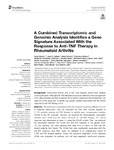A combined transcriptomic and genomic analysis identifies a gene signature associated with the response to anti-TNF therapy in rheumatoid arthritis

Use este enlace para citar
http://hdl.handle.net/2183/25159Colecciones
- Investigación (FCS) [1293]
Metadatos
Mostrar el registro completo del ítemTítulo
A combined transcriptomic and genomic analysis identifies a gene signature associated with the response to anti-TNF therapy in rheumatoid arthritisAutor(es)
Fecha
2019-07-02Cita bibliográfica
Aterido A, Cañete JD, Tornero J, Blanco F, Fernández-Gutiérrez B, Pérez C, et al. A combined transcriptomic and genomic analysis identifies a gene signature associated with the response to anti-TNF therapy in rheumatoid arthritis. Front Immunol. 2019;10
Resumen
[Abstract] Background: Rheumatoid arthritis (RA) is the most frequent autoimmune disease involving the joints. Although anti-TNF therapies have proven effective in the management of RA, approximately one third of patients do not show a significant clinical response. The objective of this study was to identify new genetic variation associated with the clinical response to anti-TNF therapy in RA.
Methods: We performed a sequential multi-omic analysis integrating different sources of molecular information. First, we extracted the RNA from synovial biopsies of 11 RA patients starting anti-TNF therapy to identify gene coexpression modules (GCMs) in the RA synovium. Second, we analyzed the transcriptomic association between each GCM and the clinical response to anti-TNF therapy. The clinical response was determined at week 14 using the EULAR criteria. Third, we analyzed the association between the GCMs and anti-TNF response at the genetic level. For this objective, we used genome-wide data from a cohort of 348 anti-TNF treated patients from Spain. The GCMs that were significantly associated with the anti-TNF response were then tested for validation in an independent cohort of 2,706 anti-TNF treated patients. Finally, the functional implication of the validated GCMs was evaluated via pathway and cell type epigenetic enrichment analyses.
Results: A total of 149 GCMs were identified in the RA synovium. From these, 13 GCMs were found to be significantly associated with anti-TNF response (P < 0.05). At the genetic level, we detected two of the 13 GCMs to be significantly associated with the response to adalimumab (P = 0.0015) and infliximab (P = 0.021) in the Spain cohort. Using the independent cohort of RA patients, we replicated the association of the GCM associated with the response to adalimumab (P = 0.0019). The validated module was found to be significantly enriched for genes involved in the nucleotide metabolism (P = 2.41e-5) and epigenetic marks from immune cells, including CD4+ regulatory T cells (P = 0.041).
Conclusions: These findings show the existence of a drug-specific genetic basis for anti-TNF response, thereby supporting treatment stratification in the search for response biomarkers in RA.
Palabras clave
Rheumatoid arthritis
Genomics
Transcriptomics
Multi-omics association analysis
Anti-TNF therapy
Genomics
Transcriptomics
Multi-omics association analysis
Anti-TNF therapy
Versión del editor
Derechos
Atribución 3.0 España
ISSN
1664-3224






